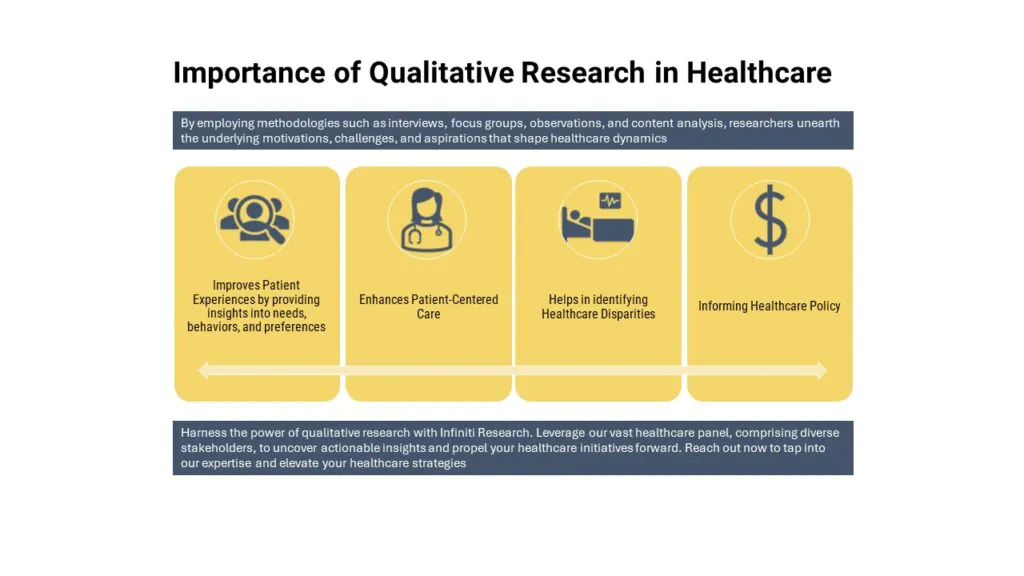Introduction:
In the ever-evolving landscape of healthcare, where the convergence of patient-centric care, evidence-based medicine, and operational efficiency is paramount, qualitative research emerges as a beacon of understanding. Its ability to delve into the intricate tapestry of human experiences, perceptions, and behaviors provides invaluable insights that quantitative data alone cannot capture. This article explores the multifaceted realm of qualitative research in healthcare and outlines best practices to maximize its impact.
Understanding the Essence of Qualitative Research:
Qualitative research in healthcare transcends mere data collection; it is a journey into the realms of human experiences, beliefs, and cultural contexts. By employing methodologies such as interviews, focus groups, observations, and content analysis, researchers unearth the underlying motivations, challenges, and aspirations that shape healthcare dynamics. Unlike quantitative research, which focuses on numerical data and statistical analysis, qualitative research offers a holistic understanding of complex phenomena, providing rich, contextually nuanced insights.

Tailoring Methodologies to Healthcare Contexts:
One size does not fit all in qualitative research methodologies. Each healthcare setting presents unique challenges and opportunities that demand tailored approaches. Whether exploring patient perspectives on chronic disease management, understanding clinician decision-making processes, or uncovering barriers to healthcare access in underserved communities, researchers must carefully select methodologies that align with the research objectives and the intricacies of the healthcare context. Qualitative methods such as ethnography, phenomenology, grounded theory, and narrative analysis offer diverse lenses through which researchers can explore and interpret healthcare phenomena.
Engaging Stakeholders in the Research Process:
Stakeholder engagement is fundamental to the success of qualitative research in healthcare. By involving patients, caregivers, healthcare professionals, administrators, policymakers, and other relevant stakeholders from the outset, researchers ensure that the research is grounded in real-world perspectives and priorities. Collaborative partnerships foster a sense of ownership and facilitate the co-creation of knowledge, ensuring that research findings resonate with key stakeholders and are actionable in practice. Additionally, involving diverse voices in the research process promotes inclusivity, cultural sensitivity, and equity in healthcare research endeavors.
Ensuring Rigor and Validity in Qualitative Research:
Rigor and validity are cornerstones of high-quality qualitative research. While qualitative inquiry is inherently subjective and interpretive, researchers must adhere to rigorous methodological practices to enhance the credibility and trustworthiness of their findings. Strategies such as prolonged engagement in the field, triangulation of data sources and methods, member checking, and peer debriefing help mitigate bias, enhance reflexivity, and promote transparency in the research process. By meticulously documenting the research process and employing systematic approaches to data analysis, researchers can ensure that their findings are robust, reliable, and transferable to other contexts.
Embracing Technology to Enhance Research Processes:
In an increasingly digital world, technology plays a pivotal role in advancing qualitative research methodologies. Digital tools and platforms offer innovative solutions for data collection, analysis, and dissemination, streamlining research processes and expanding the reach of qualitative inquiry. From online surveys and virtual focus groups to qualitative data analysis software and multimedia storytelling tools, technology empowers researchers to collect, organize, and analyze data more efficiently while facilitating collaboration and knowledge sharing among research team members. However, it is essential to balance technological advancements with the preservation of human connection and the ethical considerations inherent in qualitative research.
Ethical Considerations in Healthcare Research:
Ethical conduct is paramount in qualitative research, particularly in healthcare settings where the well-being and rights of participants must be safeguarded. Researchers must adhere to established ethical guidelines and principles, including respect for autonomy, beneficence, non-maleficence, and justice. Informed consent processes should be transparent, voluntary, and culturally sensitive, ensuring that participants understand the purpose, risks, and benefits of their involvement in the research. Moreover, researchers must uphold confidentiality and privacy standards, anonymize data where appropriate, and navigate potential conflicts of interest with integrity and transparency. By prioritizing ethical considerations throughout the research process, researchers uphold the trust and integrity of the research endeavor while honoring the dignity and rights of participants.
Translating Insights into Actionable Strategies:
The ultimate goal of qualitative research in healthcare is to catalyze positive change and inform evidence-based practice. Translating research insights into actionable strategies requires collaboration, communication, and commitment from all stakeholders involved. Researchers must effectively communicate their findings in accessible formats tailored to diverse audiences, ensuring that key messages resonate with policymakers, healthcare practitioners, administrators, and patients alike. Engaging stakeholders in the co-creation of solutions fosters a sense of ownership and facilitates the integration of research findings into policy development, clinical practice guidelines, quality improvement initiatives, and community-based interventions. By bridging the gap between research and practice, qualitative research drives meaningful improvements in healthcare delivery, outcomes, and equity.
Conclusion:
Qualitative research holds immense promise as a catalyst for innovation, equity, and patient-centered care in healthcare. By embracing best practices and ethical principles, healthcare organizations can harness the full potential of qualitative research to address complex challenges, seize emerging opportunities, and drive transformative change. Through collaborative partnerships, rigorous inquiry, and meaningful engagement with diverse stakeholders, qualitative research serves as a beacon of understanding, guiding us toward a future where healthcare is inclusive, responsive, and equitable for all.

